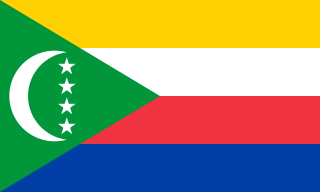The history of the Comoros goes back some 1,500 years. The Comoros have been inhabited by various groups throughout this time. France colonised the islands in the 19th century, and they became independent in 1975.
Robert Denard was a French soldier and mercenary. Sometimes known under the aliases Gilbert Bourgeaud and Saïd Mustapha Mahdjoub, he was known for having performed various jobs in support of Françafrique—France's sphere of influence in its former colonies in Africa—for Jacques Foccart, co-ordinator of President Charles de Gaulle's African policy.

The national flag of the Union of the Comoros was designed in 2001 and officially adopted on January 7, 2002. It continues to display the crescent and four stars, which is a motif that has been in use in slightly various forms since 1975 during the independence movement. In its constitution, the government of the Comoros refers to the insignia as l'emblème national, or the "national emblem", though it is understood to actually represent a flag.

Elections in the Comoros take place within the framework of a multi-party democracy and a presidential system. The President and the majority of the seats in the Assembly of the Union are directly elected.
Said Mohammed Djohar was a Comorian politician who served as the 4th President of the Comoros during the 1990s.

Mohamed Taki Abdoulkarim was President of the Comoros from 25 March 1996 until his death on 6 November 1998.
Mohamed Ahmed was a Comorian politician. He was born in Mutsamudu on the island of Anjouan. During the 1950s, he became one of the most important non-French political leaders in the Comoros, and served as vice-president of the government council from 1957 until 1962. After this he became less influential until after Comoros became an independent nation in 1975. Ahmed was a strong supporter of the May 1978 coup in which Ali Soilih was overthrown. He became a co-chairman of a directorate which took charge of the government, but lost this position in October 1978 as the other co-chairman, Ahmed Abdallah took complete power.
Said Atthoumani was a Comorian politician.
Abdallah Mohamed was a Comorian politician. He served as prime minister of Comoros from January 7, 1976, until December 22, 1978. He was a nephew of Mohamed Ahmed. For most of that time he was serving under President Ali Soilih. After Soilih was overthrown and killed in a Coup d'état, Mohamed remained in his post for a few months under the new regime of Ahmed Abdallah. He was eventually dismissed, however. He died in Mutsamudu, on the island of Anjouan in 2000.

Prince Said Mohamed Jaffar, full name Said Mohamed Jaffar El Amjad, as the 2nd President of Comoros (État comorien) from August 1975 until January 1976, as well as chief minister of the Comoros government from July until December 1972.
The Comorian Union for Progress is a political party in the Comoros.
The Comoros is an island nation in the Indian Ocean, located off the eastern coast of Africa. France first established colonial rule in the Comoros in 1841. Agreement was reached with France in 1973 for the Comoros to become independent in 1978. On July 6, 1975, but the Comorian parliament passed a unilateral resolution declaring independence. The deputies of Mayotte, which remained under French control, abstained. Referendums on all four of the islands excluding Mayotte showed strong support for independence. Ahmed Abdallah proclaimed the Comoros' independence on September 5, 1975 and became its first president.
Comoran society and culture reflect the influences of Islam and the traditions of East Africa. The former provides the basis for religion and law; the East African influence is evident in the language, a Swahili dialect, and in a number of pre-Islamic customs. Western, primarily French, influences are also prevalent, particularly in the modern educational sector, the civil service, and cultural affairs.

A constitutional referendum was held in the Comoros on 1 October 1978 following the overthrow of Ali Soilih on 13 May. The new constitution created a presidential and federal republic, granting each island its own legislature and control over taxes levied on individuals and businesses resident on the island, whilst reserving strong executive powers for the president. It also restored Islam as the state religion, while acknowledging the rights of those who did not observe the Muslim faith.

The Rally for Change and Democracy was a political party in the Comoros led by Said Hassane Said Hachim.

Comoros–North Korea relations refers to the current and historical relationship between the Comoros and the Democratic People's Republic of Korea (DPRK), commonly known as North Korea. Neither nation maintains an embassy in their respective capitals. Formerly the DPRK had an ambassador stationed in Moroni.
Cannabis in Comoros is currently illegal. It was legal during the Comorian historical period between January 1975 and May 1978, when president Ali Soilih legalized cannabis consumption among other measures.






